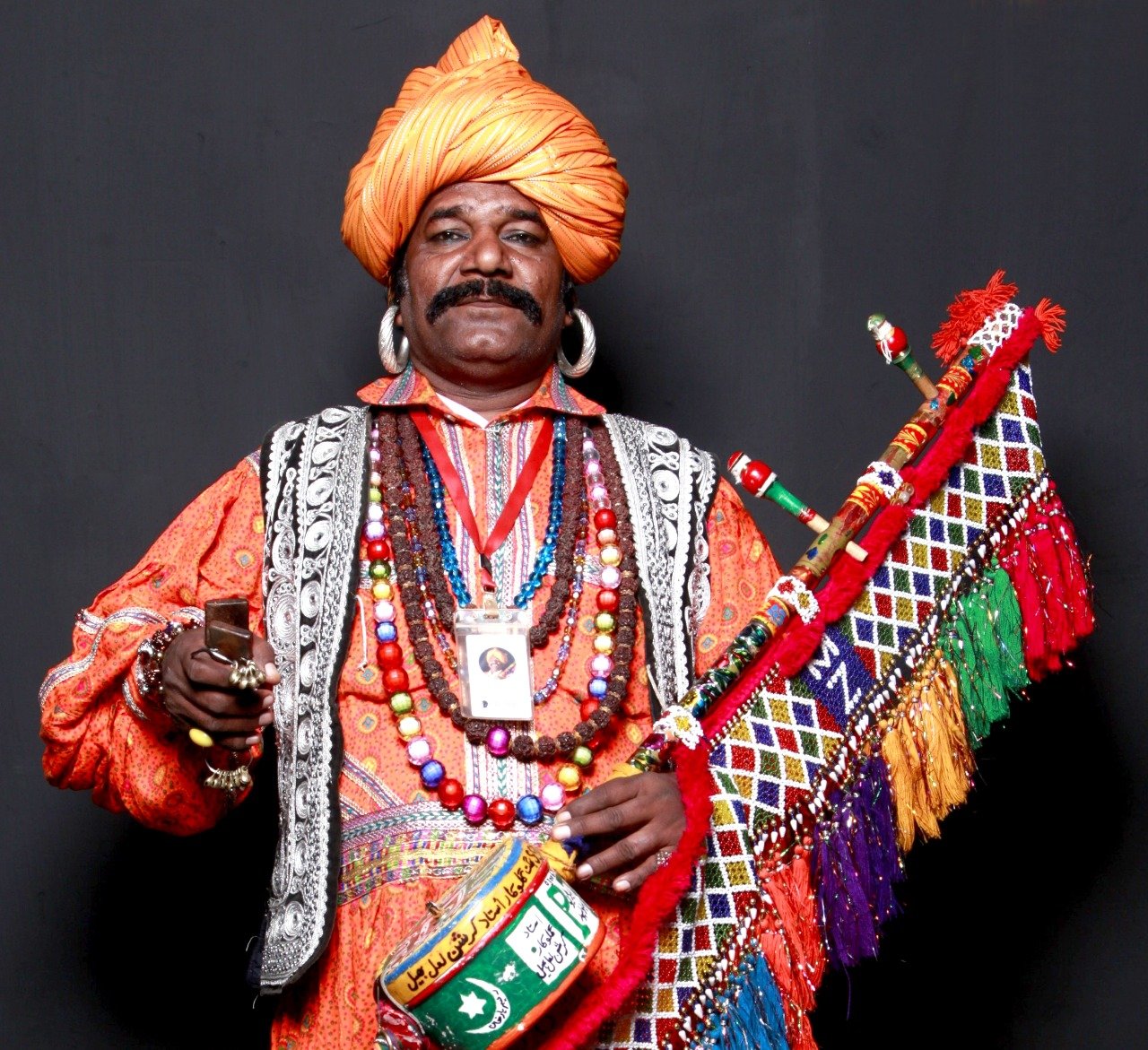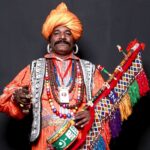
The Fading Soul of Pakistan’s Diversity–an encounter with Bheel singing community from Cholistan

By Zeeba T. Hashmi
A group of singers from the Bheel community were my generous friends who asked to be my hosts me for one evening. My friend, late Krishan Lal Bheel had invited me to learn more about their lives as he introduced me to the music he composed and sang to. The dreariness of the room soon erupted into vivid melodies of his stringed Yaktara and the colorful Raanti instruments. Such joy in that tiny, unfamiliar room that was filled with music and stories of love, humanity and peace and thus bringing back sacredness of ancient forgotten spirits to the place, in spite of the frequent interruptions made by the hotel manager who kept asking us to tone it down. We politely tried our best to comply.
The members of the Hindu Bheel community are mostly landless, and they are known for their melodies and making traditional musical instruments, ornamented in elaborately embroidered bright colored fabrics. They make their stringed instruments with animal hides and wood, and hollowed pipes that are magic to the ear. They are known for their distinct vocals and the art of storytelling. Their women wear glass bangles all over their arms to match with their Cholis and Ghagharas. The singers among them are very particular about their diet and understand well the effects that different foods have on their vocal chords. To them, singing is a medium that brings them closer to God, and it is their love for music that has made them so well-versed with all mystical expressions. They hold great reverence for Sufi saints. They take their names and sing to their poetry with as much devotion as they have for their Devtas through the bhajjans glorifying them. To them music represents universal love, a language through which they converse with the mortals and the divine. They speak Marwari, Koli and other dialects. They don’t have enough written literature in their languages except for a few fragments. However, they have adapted the local dialects to make a common language understood by all.
Bheels are a sub-sect of the Hindu minority in Pakistan, commonly known as “Dalits” or “untouchables”. They mainly live in Tharparkar and in the Cholistan desert of Southern Punjab and are recognized as a scheduled caste under Pakistani constitution. The Bheels have been living in this land for thousands of years, and a majority of them even decided to stay here instead of migrating to India in the aftermath of partition in 1947. They felt they would not face the discrimination they did among upper caste Hindu compatriots.
Constitutionally, the Dalits were given the status of a scheduled caste under the Scheduled Castes Declaration in 1957, which ensured them certain privileges, such as the quota in jobs. But no serious effort was made to implement the declaration and give them their due rights, as were enshrined in the declaration. The presidential ordinance was later repealed in 1998 during Nawaz Sharif’s tenure, when the quota for scheduled castes was converged in the general quota for minorities. The effect of this deliberate negligence and marginalization created problems for the Bheel community in terms of exercising their rights as Pakistani citizens, marriage registration and a lack of representation in the Parliament.
According to official statistics, there are approximately 3 million Hindus residing in Pakistan. Of these, 2.5 million belong to scheduled castes. However, the Scheduled Castes Federation of Pakistan disputes the figures presented by the state. The growing orthodoxy, a harsh feudal environment in areas home to the community and lack of education, have pushed the Bheel community to poverty. Under the strict influence of the waderas, these landless people are deliberately kept marginalized, with no health or education facilities in their remote and inaccessible villages.
‘We are a Dervaish people, we do not indulge in the lies of politics,’ Krishan Lal Bheel, explained to this scribe. ‘However, we do have our shortcomings, and we ourselves are to be blamed for these shortcomings as we keep giving in to our own vulnerabilities,’ he said referring to the sad reality of the helplessness they feel towards their marginalization and exploitation.
Forced conversions have been taking place over the years in Sindh, and such incidents are increasing. The landlords take their women who are kept as wives after their conversion, but after the passage of a few years, they are sent back to their villages where these women are viewed as “damaged goods” by their own community. These women cannot revert back to their religion for the fear of the backlash coming from the clerics. There have also been incidents of kidnappings for ransom and demolition of their worship places and houses. But the grievances are never addressed. The powerful feudal lords manage to suppress the news in the mainstream media and easily manipulate the police and courts to deny justice to the victims.
Bheels face intimidation from the clerics who continue to violate their fundamental rights with impunity. They have no faith in politics which they consider having become polluted. However, lately there has been an awakening of sorts, as many scheduled-caste communities are beginning to protest the gross injustice they face and are struggling to forge a political movement to address their grievances. There are instances of Sindhi nationalist parties and the Dalit community members where they have come together to demonstrate against the demolition of their houses and temples. The Scheduled Castes Rights Movement is spearheading their cause, but it needs to be seen how much impact it could have given the nexus of political power with feudal lords. If nothing is done immediately to address the plight of the Bheel community, then a beautiful voice that gives soul to Pakistan’s diversity might fade away.



